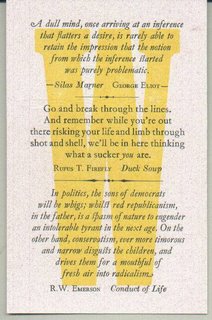
Last night on public television I watched a program about Hollywood's blacklist era -- or so Dave described it when he clicked onto it, as I continued to gently edit some pages. Soon I was caught up into the unfolding saga of two friends: director Elia Kazan, and playwright Arthur Miller. How each responded to the political and employment pressures on them during the anti-Communist "witch hunt" of the House UnAmerican Activities Committee (HUAC) attack on Hollywood formed the underlying threads of the narrative. Each took actions based on principle, but with far different results.
Most striking to me last night was the discovery that Miller's play "The Crucible," which I read in high school as part of the English/US History curriculum focused on the America of 1500 to 1900, carried immense significance as commentary about the McCarthy/HUAC years and the choices of Miller and his once dear friend Kazan. How could the splendid teachers in my life have avoided pointing this out? But they did. And how could I, even watching the recent film release of "The Crucible," have remained ignorant of its political application to the 1950s and to today? God knows. But I did.
Thank heavens for more information, more passion, more perspective.
Awakening people to political implications, to value choices, and to their own strength as voices and hearts outspoken has been a long-term role of small presses and the writers who seek them. Thomas Paine presented perhaps the most famous American small-press pamphlets, beginning with his 1776 publication of "Common Sense," calling his compatriots into the War of Independence. His others are at least as powerful and respond to the horrors of the French Revolution, the misuse of religion, and the enduring distorting power of the monarchy.
In this light, I welcome the word of poets and printers Greg Joly and Bob Arnold, Vermonters.
Greg Joly offers his work and the work of others through Bull Thistle Press (founded in 1990 in Jamaica, Vermont). His recent postcard-size broadside "W" offers significant statements of the past as a gentle but direct critique of today's war-loving Presidency. An earlier one, from 1998, quotes back-to-the-land "heroes" Helen and Scott Nearing, standing up for presentation and discussion of "public questions" as "a right, a privilege, and a duty."
Bob Arnold's Longhouse Press emerged in Green River, Vermont (near Brattleboro), in 1971. At first, Bob published through mimeo and photocopy, following the example of other political and poetry-driven presses of the 1950s and 1960s. One of my favorite pieces from this time is "Potterwoman" by Vermont poet Barbara Moraff, whose wrestling matches with motherhood, sustainable living, and the twin arts of pottery and poetry become a feminist manifesto of love and strenghth. Bob's own poetry also emerged through Longhouse, but also through other presses, like Pentagram and Barry Sternlieb's Mad River Press. Later, influenced by friendships with Joly and Ed Rayer (Swamp Press), Bob incorporated letterpress work in the covers of his productions.
Now the two printer/poets also collaborate in street poetry, speaking up for the America of Thomas Paine. Taking to the streets of Brattleboro at first to raise support for the victims of Hurrican Katrina, they now also host "discussion of public questions" such as the continued occupation of Iraq, and the threat of further global armed confrontations as the United States leadership braids together oil, responses to terrorist threats, and a sense of moral outrage.
I quote here from Bob's ever-informative web page, where he provides long "letters" about poetry, music, and love of country: "In an act of good citizenship and being with the ones you love, Bob Arnold & Greg Joly will join with others at the Brattleboro Commons on Sunday July 30th to greet peace activists Frances Crowe and Cindy Sheehan visiting town to set their shoulders to the wheel to continue Impeachment proceedings (remember: we the people?) on the current President of the United States, a war criminal. We plan to contribute with our year long readings for New Orleans /Katrina by drawing a circle 10 feet around and just begin reading poems. Quietly. Probably under some maple tree. For Vermont, Love & Protest."
Bob's web site is
www.LonghousePoetry.com -- Greg, who lives "off the grid" with his wife Mary, isn't online, but Kingdom Books will forward messages to him at Bull Thistle Press if need be.
I'll wrap up here with a simple observation of my own: For both poetry and the political responsibility of thought and speech, small presses contribute a glorious independence. When, in addition, those presses add the slow and lovely work of fine design to their printings, they help to ensure that the work will be held, read, kept, and pondered.
Tomorrow: Politics and mysteries.


